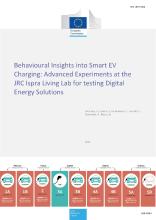Context
The Living Lab for testing Digital Energy Solutions manages a charging site with nine electric vehicle charging points at the JRC site of Ispra in a two-year experimental research project started in 2022. Staff members can use these charging stations for free and, in exchange, provide data on their charging sessions. Several photovoltaic panels power the charging station and create a 100% clean energy source.
Goals
Incentivising employees to use the charging station when there are peaks in the solar energy supply is challenging as it conflicts with a peak of undue occupancy of parking spots at the charging stations (keeping others from charging their car). The goal is to refine the messaging conveyed to users via the charging station and electronic means.
Methods
- A survey to staff to identify elements of an effective communication strategy for improving user behaviour
- A field experiment testing reframed communications (signage, email)
Expected outcomes
Our experimental results will determine whether the interventions effectively stimulate a more efficient use of solar energy and a more coordinated behaviour of users at the charging station. If this is the case, the behavioural insights learned from this experiment could be extended to other charging stations in different towns.
Publications

In an effort to anticipate innovative solutions for policies related to the European Green Deal on areas such as smart grids, demand response and renewable electricity integration into the grid, in the last 2.5 years the JRC Living Lab for testing Digital Energy Solutions (DES-Lab from now on), operating within the SMARTEN Work programme project, has been conducting research by testing and deploying smart charging systems for EVs and their impact on the use by staff on JRC sites.
Using PRISM, a customisable EV-charging wallbox provided by an Italian start-up, the research aimed at studying the impact of smart charging systems on user experience and staff behaviour, and to investigate the behaviours and choices of EV owners in response to various incentive schemes for utilising a workplace charging station.
The experimentation rounds in 2023 highlighted a number of issues concerning the behaviour of an exemplary client group and their use of the charging stations, particularly the prolonged undue occupancy of the charging points, which is not easy to manage in workplace-charging situations.
These findings stressed the need for improved user coordination, better adherence to the rules for chargers’ fair use, and better insight, as well as greater awareness of the optimal charging timing to maximise the use of renewable energy.
Whilst the use of targeted communication with users had limited impact on their behaviour, the implementation of authentication and credit-point schemes proved to be more effective in addressing behavioural obstacles, even though the effects of the more elaborate credit-point scheme appeared to affect mainly those consumers most intensively using the charge field.
Latest knowledge from this Project
More information
| Coordinators | Marion DUPOUX Andrea BLASCO |
| Participants | Stefano TARANTOLA Andrea CARBOTTI |
| Geographic coverage | Italy |
| Originally Published | Last Updated | 15 May 2023 | 04 Oct 2024 |
| Related links | |
| Knowledge service | Metadata | Behavioural insights | Behavioural insights for energy |
| Digital Europa Thesaurus (DET) | electric vehiclesolar energycharging infrastructuresustainable mobility |
Recommended reading
Delivering the European Green Deal: JRC study finds mixed progress so far
Once a green capital, always a green capital: Oslo’s continued path to sustainability
Behavioural Insights into Smart EV Charging: Advanced Experiments at the JRC Ispra Living Lab for testing Digital Energy Solutions
Share this page
